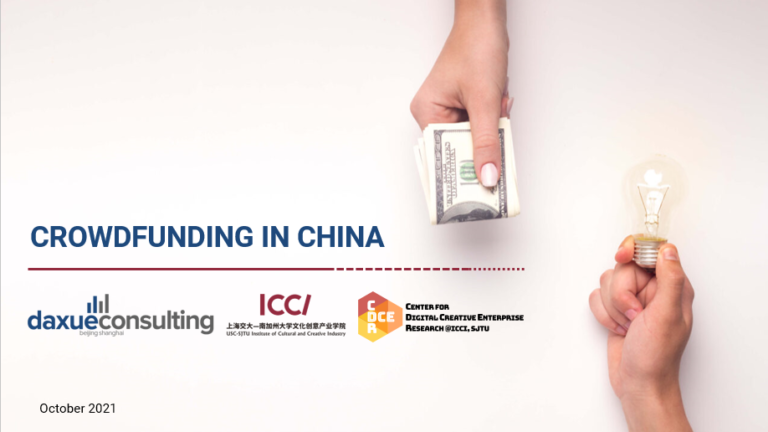Crowdfunding is a concept derived from crowdsourcing and micro-finance. The practice entails that enterprising individuals or firms fund new projects or ventures through the contributions of large groups of people. While most commonly conducted through online sites and mobile apps, Crowdfunding can also take the form of mail order, subscriptions, benefit events, and other methods.
Below are the four most common types of crowdfunding:
- Equity-based crowd funding
- Reward-based crowdfunding
- Debt-based crowdfunding (peer-to-peer lending)
- Donation-based crowdfunding
Comparison of China’s Crowdfunding market to other markets

The crowdfunding market in China is still relatively underdeveloped compared to more mature markets such the West, but this is quickly changing. As of 2016, Chinese firms raised over 101 billion USD online for their ventures, according to Crowdfund Insider. The different performances in both countries can be explained by the difference in regulations and investment culture. In the United States, for example, there have been laws imposed with the intent to facilitate new capital formation for startups by easing securities regulations which screens and protects equity-based crowdfunding and issuing securities. In China, there are essentially no regulations or oversight agencies that vet crowdfunding ventures. Furthermore, China has weak intellectual property laws that routinely fail to protect entrepreneurs; with the given probabilities of IPR infringement or theft, China has effectively stifled potential innovation in the crowdfunding sector.
The U.S. is filled with experienced individual investors operating in a more developed industry. However, the crowdfunding methods that work best there are not necessarily the best for China. New channels such as equity crowdfunding promise an uncertain return on investment and are perceived as a high risk particularly to Chinese investors. As a result, reward-based crowdfunding has been more readily accepted in China. Unlike other methods, reward-based crowdfunding offers a tangible product or other forms of collateral for their investment, as well as early access to new products.

The U.S. is filled with experienced individual investors operating in a more developed industry. However the crowdfunding methods that work best there are not necessarily the best for China. New channels such as equity crowdfunding promise an uncertain return on investment and are perceived as a high risk particularly to Chinese investors. As a result, reward-based crowdfunding has been more readily accepted in China. Unlike other methods, reward-based crowdfunding offers a tangible product or other form of collateral to investors for their investment, as well as early access to new products.
In general, the Chinese crowdfunding scene is slowly developing the structure that is so well-established in the U.S. and other western countries. In December 2014, the Securities Association of China (SAC) released its first tentative drafts and documents regarding crowdfunding, which can be found here. Specifically, the SAC aimed to clarify who can be involved as an investor, what platforms are authorized, financial restrictions, and other applicable concerns for the nascent industry, according to China Briefing. For investors, this means a significantly increased threshold for “reputable persons”. SAC regulations could require at least one of the following of a prospective investor to be qualified:
- An investment of at least 1 million RMB for a given project;
- Net assets in excess of 10 million RMB; or finally
- Financial assets of 3 million RMB and an annual income of at least 500,000 RMB over the last five years
While these standards would be consistent across many industries, different sectors may have different ranges for their ventures. For example, sites specializing on the entertainment industry, such as Yu Le Bao and Musikid, are generally geared at much lower individual investments. Here, donations of 100 and 1000 RMB are the most common amounts, according to China Briefing. After fundraising is complete, these campaigns regularly raise tens of millions of RMB. . As for the fundraising duration, most campaigns last about a year at most. This is to allow sufficient time for gathering all the necessary funds, but also short enough as to convey organized and proficient organization by the company.
Rise of Crowdfunding Giants
Initially, the U.S. leads the crowdsourcing industry for easy-to-use funding apps. Top players like Kickstarter, Indiegogo, and GoFundMe have helped raise massive amounts of capital. However, these crowdfunding titans encountered some issues with international donors, such as not being able to fulfill their orders. Consequently, China and other Asian nations began creating their platforms. Enter JD.com, one of the biggest initial China-exclusive crowdfunding platforms to emerge in recent years. It has since grown into online marketplace site, with profits and an amount of goods that rival Alibaba’s Tmall. Its original main focus, however, was to provide China’s solution to the big western platforms, which it ultimately did. JD.com successfully brought in over 1 billion USD last year, according to TechCrunch. That being said, it would not suffice to merely call JD.com an equivalent counterpart to platforms like Kickstarter. Similar to how Alibaba is much more than just “China’s Amazon”, the JD.com crowdfunding operations connect users with a much more in-depth system. As a now expansive and complex online marketplace, JD.com users can combine crowdfunding with the myriad of other online shopping activities they do, as well as funding other startups, according to Forbes.
Potential of Crowdfunding in China
According to World Bank research, as of 2016, 50% of China’s citizens were regular, active internet users, which is approximately 700 million people. This is up from 688 million in 2015. (Click here to see our latest Infographic about the consumer electronics in China). According to the International Monetary Fund (IMF), China’s total national savings constituted 48% of GDP in 2016, which is just over 5 trillion USD. With that in mind, if crowdfunding is officially supported and regulated, it could become a popular form of alternative funding for Chinese entrepreneurs and new firms. Crowdfunding platforms effectively act as an innovative financing intermediary, while simultaneously providing ease of access through the internet and smartphone apps. Another advantage is that the simple, easily accessible nature of crowdfunding apps allows small firms to fundraise internationally.
“A bag company raised 1 million USD in the U.S., 0.8 million in Europe, and 1 million in China. Basically, they successfully secured 2.8 million USD before producing,” says Matthieu David-Experton, Daxue Consulting’s CEO
Potential investors can invest in projects based on their risk tolerance, investing power, and consumer preferences on the crowd-funding platform. Next, investors can participate in select divisions of the business indirectly, providing feedback on product design or other suggestions.
The future of crowdfunding in China highly dependent on how willing investors and entrepreneurs will be to weigh the obstacles that they might face against the potential benefits of crowdfunding. As China’s market continues to grow and develop economically, crowdfunding will give the country the ability to transition its position from a manufacturing-based to an innovation-based economy with a new wave of entrepreneurs and investors emerging.
Benefits and Risks of Crowdfunding in China
One of the biggest challenges for small businesses and entrepreneurs is being able to mitigate short-run costs and see their business into profitability. With crowdfunding, these firms can easily engage with their donors and backers, draw feedback from them, and help develop their product with a customer-focused perspective. The very act of reaching for support for an idea can also reveal the interest and demand for that product. Even before launch, crowdfunding can generate significant buzz for the product. This leads us to an important insight about Chinese consumers as an aggregate. For many Chinese consumers, large businesses that they are unfamiliar with coming across as unappealing, at least until trustworthy testimonial is given. Crowdfunding provides a much clearer picture of how investor money will be spent, and what the end product is. By adding an element of trust to the equation, Chinese consumers are much more likely back a crowdfunded campaign. Starting a company in China can be a very risky and challenging venture. Insufficient funding, the inability to forecast expenses and obstacles, and low consumer and investor confidence have condemned many past international attempts to failure. With crowdfunding, we expect to see it alleviate many of these issues, and spur growth for both domestic and foreign firms.
Risks of Crowdfunding
As project evaluation remains important in attracting and maintaining investors, many risk-averse investors will seek short-term profits rather than explore potential long-term opportunities. This culture of uncertainty often limits investors who lack the skill or resources to inspect their investments. Investors also would face high risk from reward-based crowdfunding as principals may over-promise or make fraudulent claims about their projects in order to attract more funding.

While crowdfunding does offer the new firms more connectivity with their market and supporters, it also proposes some potential drawbacks. When these firms lay their products or services out for funding, the same goes for their reputations. The resulting success or failure of the firm’s launch ultimately reflects on the founders, and those who helped promote it the most. This is true post-launch as well. Should the firm meet all its fundraising objectives and begin operations, only to deliver a subpar product or service, this too may weaken their image going forward. As mentioned earlier, China’s regulatory protection for intellectual property is not well established, and competing firms face almost no legal deterrence from stealing, imitating, or otherwise infringing on property rights.
Daxue Consulting & Crowdfunding
The Daxue Consulting team has helped several startups and small businesses prepare for their crowdfunding initiatives. Our China specialists will advise you on launching, running and promoting successful campaigns in the Chinese market. Daxue’s expertise in social media and digital strategy in China has helped us to understand the crowdfunding landscape, including outreach techniques and efficient targeting of media and donors depending on the industry.
With the advantages of crowdfunding, entrepreneurs will have the ability to enhance their funding needs via online crowdfunding platforms. Chinese crowdfunding platforms should promote attractive types of business for investors to close the gap between funding demand and supply. This allows business to be directly matched with investors with maximum transparency. As the core idea of crowdfunding is to empower people to be innovators, encouragement towards this should be a priority in order to develop the economy of the country. It is imperative that the Chinese government understands the importance of this development, and continues its efforts to implement regulations that promote the advantages and lowers the risk of alternative financing. This will provide a full range of services to support local small businesses and entrepreneurs.
FOLLOW US TO LEARN MORE ABOUT CHINESE MARKETS:
The #collaborativeeconomy in #China will account for 10% of China’s GDP in 2020 https://t.co/Ach4pdtyWB@sharingcity@CoopsEuropepic.twitter.com/Dk3mTiODR9
— Daxue Consulting (@DaxueConsulting) June 22, 2017
To know more about Crowdfunding in China, contact us at dx@daxueconsulting.com





